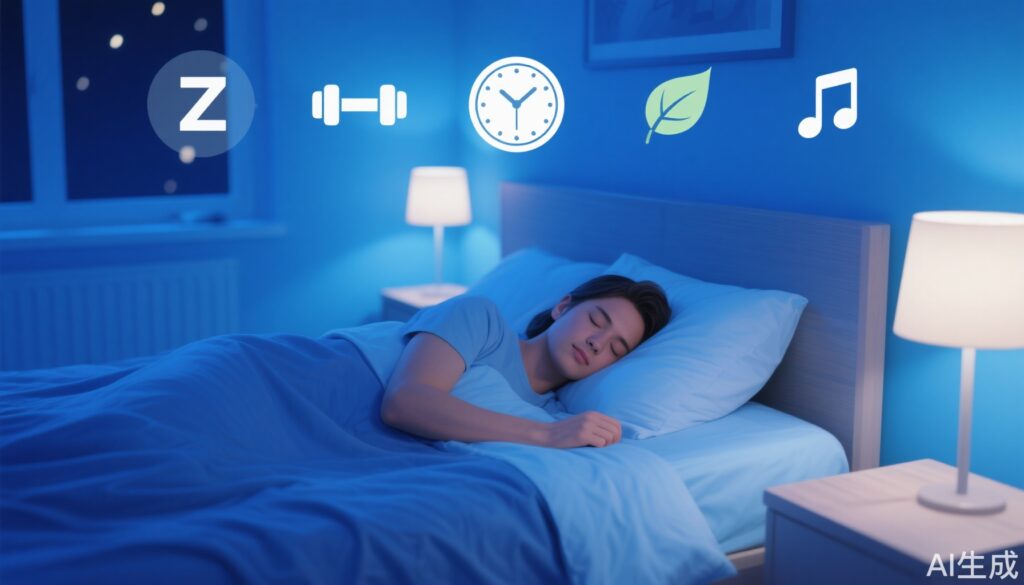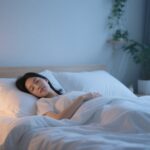Introduction: The Modern Struggle for Restful Sleep
Tossing and turning at night, staring at the ceiling, and dreading the groggy mornings—sound familiar? You are not alone. According to the Centers for Disease Control and Prevention, about one in three adults in the United States does not get enough sleep on a regular basis. Beyond feeling tired, poor sleep impacts mood, memory, immunity, and even long-term health risks such as cardiovascular disease and diabetes.
But improving sleep quality doesn’t always require expensive gadgets, supplements, or prescription medications. As research increasingly shows, small, cost-free adjustments to your lifestyle and mindset can make a significant difference. In this article, we present five simple, science-backed methods to help you fall asleep faster and wake up feeling refreshed—no financial investment required.
What the Science Says: Why Sleep Matters
Sleep isn’t just a nightly pause; it’s critical for physical and mental health. Studies link chronic sleep deprivation to weakened immune function, increased risk for obesity and metabolic disorders, heightened anxiety and depression, and impaired cognitive performance. The National Sleep Foundation recommends 7–9 hours for most adults, but quality is as important as quantity.
Many factors affect sleep quality:
– **Circadian rhythms** (your internal biological clock)
– **Sleep hygiene** (daily habits and environment)
– **Diet and exercise**
– **Mental health**
Let’s explore five free, evidence-based ways to optimize these factors.
1. Establish a Consistent Sleep Schedule
Our bodies thrive on routine. Going to bed and waking up at the same time each day helps synchronize your circadian rhythm, making it easier to fall asleep and wake up naturally. Even on weekends, try to stick within an hour of your usual schedule.
*Case Example:*
Sarah, a 34-year-old marketing professional, struggled with insomnia for months. By setting a strict 10:30 pm bedtime and 6:30 am wake time—even on weekends—she found her sleep improved within two weeks.
**Expert Quote:**
“Regularity is key. A consistent sleep schedule trains your body when to feel sleepy and when to wake up, improving overall sleep quality,” says Dr. Lisa Matthews, a sleep medicine physician at NYU Langone Health.
**Tip:**
– If you nap, keep it under 30 minutes and avoid late afternoon naps to prevent nighttime sleep disruption.
2. Create an Optimal Sleep Environment
Your bedroom should be a restful sanctuary. Research indicates that a cool, quiet, and dark environment promotes deeper sleep. The ideal room temperature is typically 68–73°F (20–23°C), and humidity should be kept between 40–60%.
**Simple adjustments:**
– Use earplugs or a white noise machine to mask disruptive sounds.
– Invest in blackout curtains or an eye mask.
– Choose a comfortable mattress and pillow that support your preferred sleep posture.
*Case Example:*
Ethan, a 28-year-old software engineer, struggled with city noise and light pollution. After using white noise and blackout curtains, his sleep latency (time to fall asleep) dropped from over an hour to less than 20 minutes.
3. Move More, Sleep Better
Physical activity is one of the most powerful natural sleep aids. Regular exercise helps regulate your body’s internal clock and reduces stress hormones.
**Best practices:**
– Aim for at least 30 minutes of moderate exercise, such as brisk walking, cycling, or yoga, most days of the week.
– Finish vigorous workouts at least 2–3 hours before bedtime to avoid post-exercise alertness.
**Data Point:**
A 2021 review in the journal *Sleep Medicine Reviews* found that regular exercise reduces the time it takes to fall asleep and increases total sleep time.
4. Mindful Eating: Diet and Sleep
What you eat—and when—can influence sleep quality. Heavy, spicy, or caffeine-laden meals can lead to indigestion or heightened alertness, making it harder to drift off.
**Guidelines for restful nights:**
– Avoid caffeine (coffee, tea, cola, chocolate) and alcohol close to bedtime.
– Keep dinner light and finish meals 2–3 hours before sleep.
– A glass of warm milk or a small snack rich in tryptophan (like a banana) may help promote sleepiness.
**Table: Foods to Avoid and Enjoy Before Bed**
| Foods to Avoid | Foods to Consider |
|---|---|
| Coffee, black/green tea, chocolate, spicy foods, heavy/fatty meals, alcohol | Warm milk, bananas, oatmeal, tart cherry juice, whole grain toast |
5. Stress Less: The Power of Mindset and Relaxation
Anxiety and racing thoughts are common culprits behind poor sleep. Relaxation techniques—such as deep breathing, progressive muscle relaxation, or mindfulness meditation—can lower heart rate and calm the mind, creating ideal conditions for sleep.
**Simple strategies:**
– Try a 10-minute guided meditation or deep breathing routine before bed.
– Listen to calming music or nature sounds.
– Read a light, non-stimulating book.
**Expert Insight:**
“People who worry about not falling asleep often make it worse. Instead, focus on creating a relaxing pre-sleep ritual and trust your body’s natural ability to rest,” recommends Dr. Michael Grandner, Director of the Sleep and Health Research Program at the University of Arizona.
*Case Example:*
After incorporating 15 minutes of mindfulness meditation into his nightly routine, John, a 45-year-old teacher, reported feeling less anxious and falling asleep within minutes.
Common Myths & Misconceptions
– **“I can catch up on sleep on weekends.”** Not true; inconsistent sleep schedules can further disrupt your circadian rhythm.
– **“Alcohol helps me sleep.”** While alcohol may make you sleepy initially, it disrupts REM sleep and leads to poorer sleep quality overall.
– **“Sleeping pills are the only solution.”** Medication may be necessary for some, but most sleep issues respond well to lifestyle and behavioral changes.
Expert Recommendations: When to Seek Professional Help
If you consistently struggle with sleep despite trying these methods—or if you experience symptoms like loud snoring, gasping for air, or daytime sleepiness—it’s important to consult a healthcare provider. Conditions like sleep apnea, restless legs syndrome, and chronic insomnia require tailored medical intervention.
Conclusion: Sleep is Within Reach
Quality sleep is a cornerstone of good health, and achieving it doesn’t have to be complicated or costly. By establishing routines, creating a restful environment, moving your body, eating mindfully, and calming your mind, you can unlock better sleep—starting tonight. Stick with these habits, and most people will see gradual, lasting improvement.
References
1. Centers for Disease Control and Prevention. Sleep and Sleep Disorders. https://www.cdc.gov/sleep/index.html
2. National Sleep Foundation. How Much Sleep Do We Really Need? https://www.sleepfoundation.org/how-sleep-works/how-much-sleep-do-we-really-need
3. Kredlow MA, Capozzoli MC, Hearon BA, Calkins AW, Otto MW. The effects of physical activity on sleep: a meta-analytic review. J Behav Med. 2015 Jun;38(3):427-49.
4. Irish LA, Kline CE, Gunn HE, Buysse DJ, Hall MH. The role of sleep hygiene in promoting public health: A review of empirical evidence. Sleep Med Rev. 2015 Aug;22:23-36.
5. American Academy of Sleep Medicine. Alcohol and Sleep. https://sleepeducation.org/healthy-sleep/alcohol-and-sleep/
6. Sleep Medicine Reviews. Exercise for improving sleep in adults. 2021.


